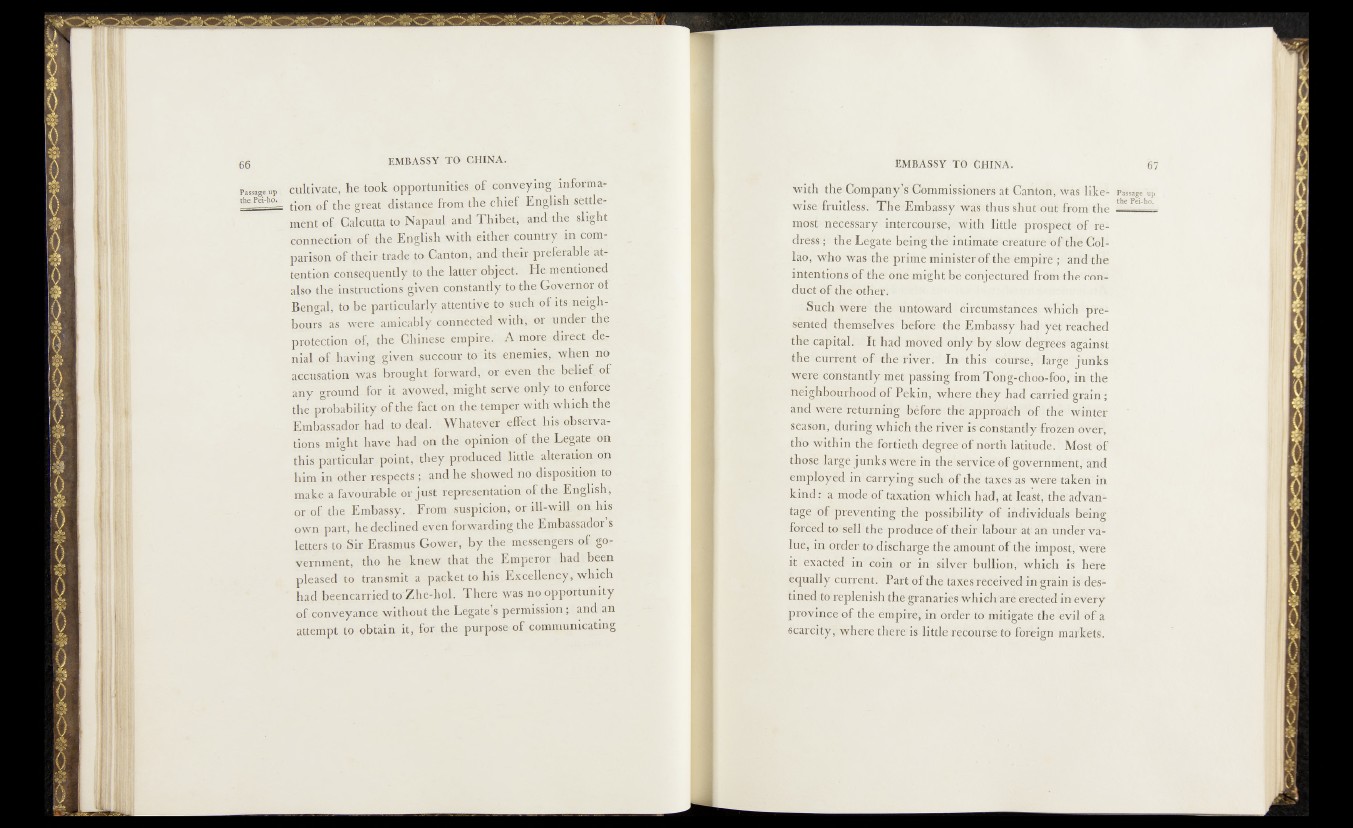
cultivate, hegtpok opportunities,;o£p&nyeÿing\ information
ofdhei||t|ae distance from the chief' EnglishsSfittfor
ment of Calcutta to N'afaaul and Thib(et> .andrthe slight
connection o f the E n g ^ h withieithee»cQun*sy in.com»
parison of-their trade to.,Canton', and^thefeprfeferablp .atr
tention consequentlyjto the latter"ohjgcB. He raentiojaed
also the instructions given constantly to the Goyemo-yof
Bengal to be particular!y^attentive -to'^ÿichôfVits^n&lgh>
bopr^i.3s,^efe-amicably connected:with,, or mnder^tjbg
prpte<?tipnrof,1 the Chinpsf^mpired - , jbrpfttyjpr
niai of h^vingtigiven suce.oar tarits- cmeinies^i^hlp.'^o
accusation, was .brought forward,
any ground for it avowed,might>jcJfce..©hl#^dniÉeé
the probability of tforfact on theTemper with whjçfothè
Embass^dpnhadrtp ^ l . Wh a^Y ^ i f M ^ i h i ^ l « ^ -
tfggg might have had on thejppinion of t^ L e j a te <0n
this particular.point, they produced little alteration on
4 im in other;.respeets ; and he showed no-dis-ppsition-”to
make?afavourable or just representation of thc^finghsh1,
orjof th t Embassy* From suspicion, or $11-wi%£ni h h
ownTpart, hq declined pyfn forwarding the Embassador’s
letters to Sir Erasmus Gower, by the messenggf£jjj offt^o-
vernment, tho he knew that the Emgerôr- had; been
pleased to transmit a packet to his Excellency, which
had bqencarried torZhe-hol. There was no opportunity
of conveyance without the Legate’s permission j pandan
attempt to-obtain it, for the purpose of communicating
with the Company's.,%'mmi^ibher^-at Canton, Was like- r ^ e up
wis'e: fruitiest The'-Emba-Ssy-wastthus shut out-from the * e ^>ei'ho'
foost>mee^sar^H#tefcb^^sp^ith dit-de pthsp^ect’ df re-
drem-sAeTegatdhelrlga'helntimate Crekttife^f the Collar,
;wh©>Was the-'prime minStter^fihte empire5;< 'add t-hfe
intentions' oflfhefone mighefe^iMyecturedf frOm the con-
durotfof thel&jiforid i
t'S’i^hPwgre'. the untoward ciMuffistances; which'; presented,
therSfsdlves? beforh-the Embas'sy had ye#'reached
the^capital. It had rno*$ed obi ySyisto w* de^tefesJagairist
ihei&krfent of the river. In tMs^cclurse, Ifege^jtinks
constantfyfaiet passihg‘-from, Tong4feteifoo, inttbe
nbghboui ]i<Kxh®f Pekin, whefe they hai^Pried^grain;
and 'werelaeturnirig thefore ’ the appbJa'&h ofothe** winter
seaman, dunfig^which the riy.erd|7d0h'stantly frozen oyefl
tho within 'th<ptofiiieth degMe?Mn@fth litfeud^.! 'Most'iff
forge yunks-were in thebervicePof gd^ethment, ahd
em-pldy^d in'darr-y in’g' s!Mhlof the taxfesfks -v^er^tdken in
kind; a .mode^f taxation whfoh had, 'at least,1 the advan-
ita^fe^^|to|vehting>-thel^)bssibility to® indivMu’alk being
forced tc^selldhe -produee of their-labour at an under i p |
luef -in order td discharge-the^ambulitlof the impAk/Wefe
it exkctdd? in".coin or in silver'bullion, which «is''here
equally current.’"Part of the taxes received in grain is destined
fehskplenisfethe granaries'Whicfoare fei^htM’ih ’every
provincq o f the pm-pirerin order to* mitigate theievil- of a
scardityl wheteeitfceredS' little fb^oursetO foreign markets.